KC police killed their sons and brother: These Black women want them remembered
- Oops!Something went wrong.Please try again later.
Narene Stokes walked into her house, dropped the groceries on the chair, grabbed the remote and turned on the TV.
Guilty.
Guilty.
Guilty.
She was stunned, she told The Star after former Minneapolis police officer Derek Chauvin was convicted of murder Tuesday.
Kansas City police shot and killed her son Ryan Stokes in 2013. Each time she watches another mother lose a son to police, the wound is reopened. Each time she feels the hurt, the anguish. Now, the unanswered question lingered ever-present in her mind: Would her son’s killer ever be held accountable?
Chauvin was found guilty Tuesday of second-degree murder, third-degree murder and second-degree manslaughter in the death of George Floyd last year. On May 25, Chauvin held his knee to Floyd’s neck for more than nine minutes, killing him.
Hundreds turned out to protest for days on end in Kansas City, chanting “Ryan Stokes, Donnie Sanders, Terrance Bridges, Cameron Lamb, George Floyd” as the killing launched a global cry for justice and to protect Black lives.
“Guilty! Guilty! Guilty!” her partner Melvin Crosby cried out as Narene Stokes teared up.
Families of those who have lost loved ones to Kansas City police were happy to see the verdict. But they want to see accountability for their sons, brothers and fathers.
They want their names remembered.
Ryan Stokes
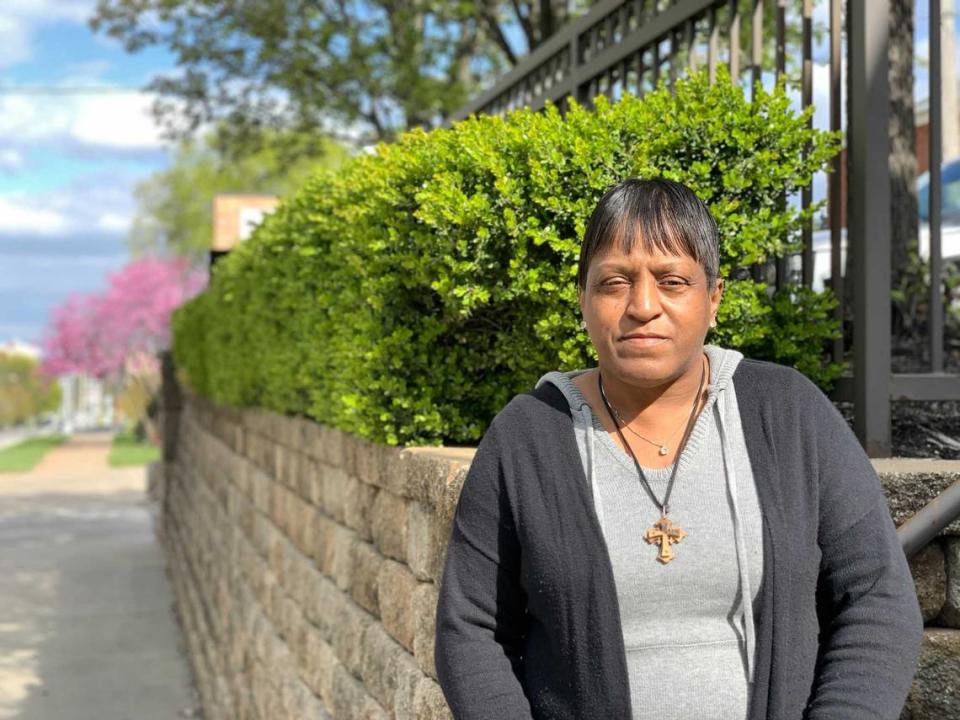
Narene Stokes twiddled her thumbs, the cross necklace her son used to wear resting on her chest as she sat in her lawyer’s office Wednesday afternoon.
It’s been eight years since she lost her son — her only son.
Ryan Stokes was unarmed when police officer William Thompson shot him in the back in July 2013 in the Power & Light District.
At the time of the shooting, Thompson said he thought he saw a gun in Stokes’ hand. Thompson and another officer were awarded a certificate of commendation for shooting Stokes. That was revoked in 2018 after police acknowledged that Stokes did not have a gun when he died.
A grand jury declined to indict Thompson and the shooting was ruled justified. A police shooting panel that reviewed the incident made no recommendations for training or department policy changes.
That hurt Narene Stokes.
“That’s not justifiable, that’s unjustifiable,” she said. “They’re demonizing Ryan’s name, character.”
Since the shooting, she said, police have lied about what happened.
His daughter, just 18 months at the time she lost her father, is now nine. She asks Narene Stokes for some of her father’s things. She has a lot of questions.
Ryan Stokes never liked to say goodbyes. Before he left that night, he told his mother he loved her. And, “I’ll see you.”
Donnie Sanders
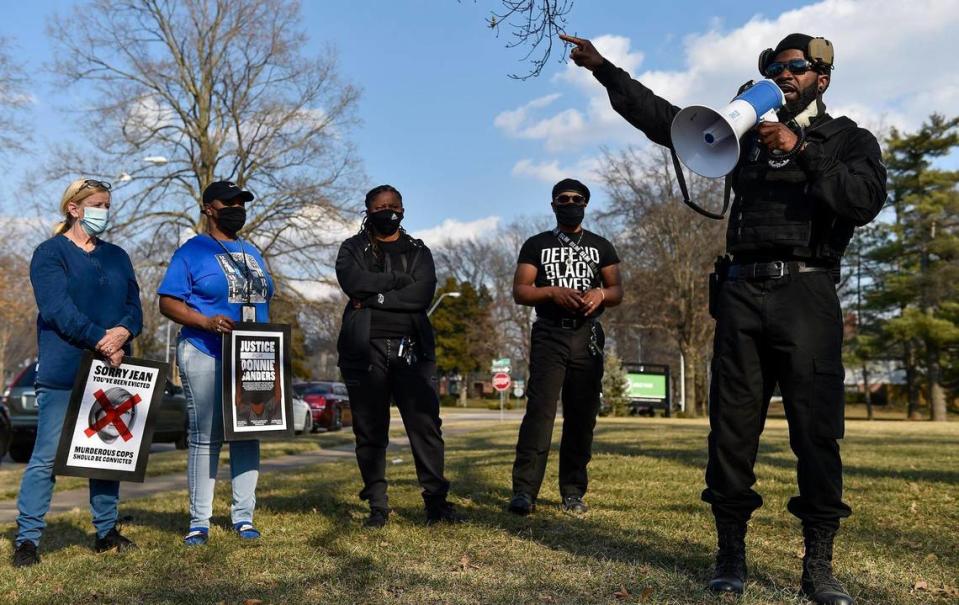
Reshonda Sanders was in her dining room with her son, brother, sister, uncle and a few cousins while they waited.
Then the verdict came: Derek Chauvin found guilty of all charges.
For Reshonda Sanders, the sister of Donnie Sanders who was shot and killed by a Kansas City police officer last spring, it was a brief sigh of relief. But she’s still fighting for her brother.
It was a “beautiful verdict,” she told The Star Tuesday evening.
“It feels like we all got justice,” Reshonda Sanders said. “But for us family members who are actually continuing to fight for justice for our murdered loved ones … but what happened with the Floyd case it feels like we all got justice.”
On a Saturday in early March, Reshonda Sanders, Donnie Sanders’ younger sister, stood in front of a group of at least 50 protesters at Arno Park.
“We just want justice,” she told the crowd. “We just want justice.”
Donnie Sanders’ older sister Youlanda Sanders told the group that she misses her little brother. “I’m tired. This ain’t right.”
As they marched down Ward Parkway, Reshonda Sanders carried a sign that read “Justice for Donnie Sanders. Youlanda Sanders picked up a megaphone and led the group in chanting “I can’t breathe.”
Days before, they learned charges would not be filed against the officer, Blayne Newton.
On March 12, 2020, Sanders encountered police on Wabash Avenue, near Prospect Avenue, when he was driving from his girlfriend’s house to his sisters house. Dash cam footage released last month shows the officer making a U-turn after passing Sanders’ vehicle. He was concerned, according to court documents that Sanders was speeding. But he didn’t turn on his vehicle’s lights or sirens or try to stop Sanders.
The dash cam footage then shows that Sanders stopped in the right lane at a flashing red light at the intersection of 51st and Prospect. While stopped he briefly turned on his left turn indicator although he was not in the left turn lane. He then turned off his blinker and proceeded to turn right without signaling, according to court documents.
The officer continued to follow Sanders without turning on his lights and sirens or attempting to stop the vehicle. He followed Sanders up an alley parallel to Wabash between 51st and 52nd streets and then, according to communication logs, told dispatch he had identified a traffic violation at 51st and Wabash.
After entering the alley, the officer turned on his vehicle’s lights and sirens as both vehicles stopped. The officer is then heard on his radio informing dispatch and other officers that Sanders “is bailing on foot.” A pursuit ensued and the officer can be heard multiple times calling for Sanders to “stop,” and to “drop.”
The officer is then heard commanding Sanders to, “Show me your hands.” Sanders responds, but it is unclear what he says on the audio recording. After a short pause, the officer is heard yelling, “Dude, drop it.” He then yells “drop” four times before firing a series of shots in rapid succession.
Sanders was unarmed.
Sanders’ family said they also heard Sanders saying “I don’t have nothin” in the background.
The differences between Sanders’ case and Floyd’s, Reshonda Sanders said, were the lack of bystander video and daylight.
“It was more a sigh of relief,” she said. “It feels like that’s the weight of it … we continue to fight and we never get justice.”
Terrance Bridges
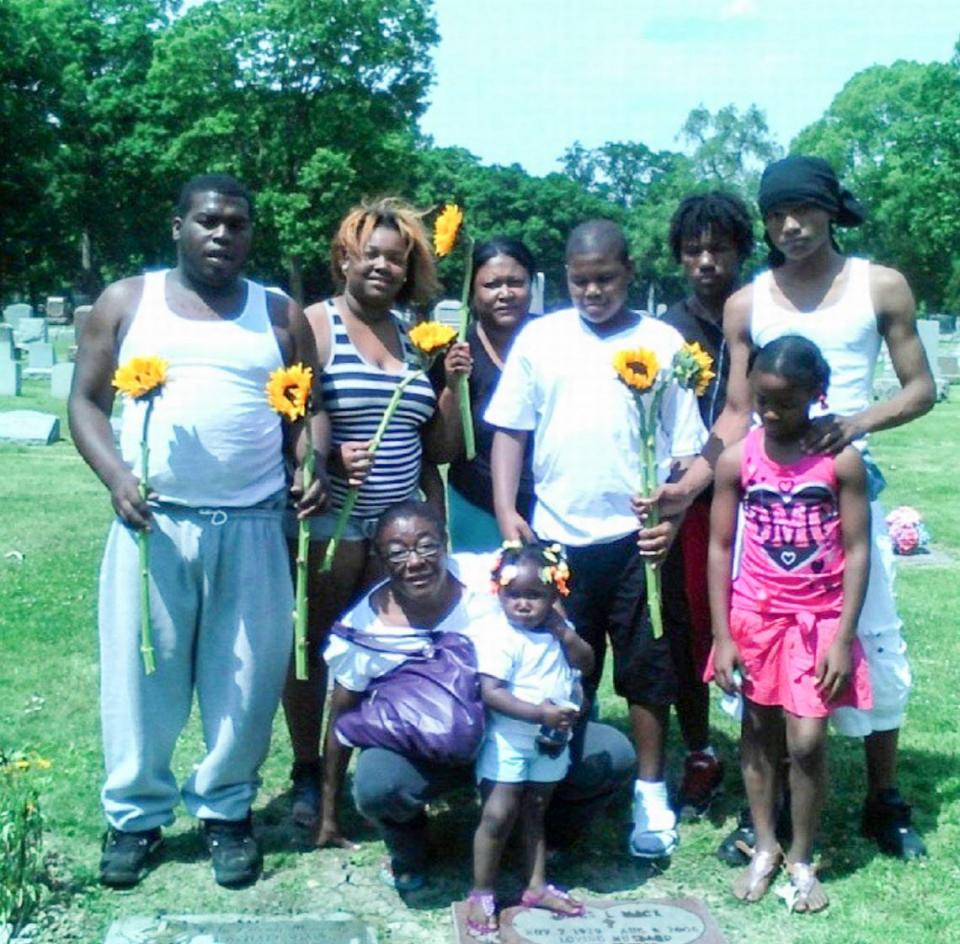
Rotonya McGee sat in her living room in her Chicago home with her husband watching the verdict, she told The Star.
“I’m happy they got justice but I want my son to be heard,” McGee said. “When is they gonna get my son’s case the attention as everybody else?”
Bridges’ girlfriend called McGee at about 4 a.m. the morning of May 26, 2019: “He’s gone.”
In the early hours of that morning, a Kansas City police officer shot Bridges in the 7000 block of Bellefontaine Avenue.
Police have maintained Bridges was a suspect in a carjacking, and that officers were responding to reports he had forced his way into a home, engaged a man in an armed confrontation and took his vehicle. Police have also said that Bridges resisted during arrest and that an officer shot him during the struggle.
According to the use of force letter from Jackson County Prosecutor Jean Peters Baker, the officer didn’t give Bridges any commands during the chase.
In the officer’s statement, he said Bridges pulled his hands out of his hoodie pocket. He said he thought Bridges had a gun.
“I was ... I was scared,” the officer said. “The way he brought his hands up out of his hoodie pocket it was like he was presenting a gun towards me so I shot him.”
The officer’s microphone recorded the moments after the shooting.
“Show me your hands,” the officer said.
“I ain’t got nothing,” Bridges responded.
The officer then told him to “get on the ground.”
Bridges said: “You shot me.”
“Why’d you attack me, dude?” the officer said.
“I didn’t attack you,” Bridges said.
Bridges later died from his injuries at a hospital. He was unarmed.
“I want my baby to go viral,” McGee said. “A lot of people probably don’t even know he got killed … he ain’t go viral like everybody else’s stories.”
Everyday, she prays for change.
“I’m gonna get something done,” McGee said. “Somebody gonna hear me. Somebody gonna hear me.”
Cameron Lamb
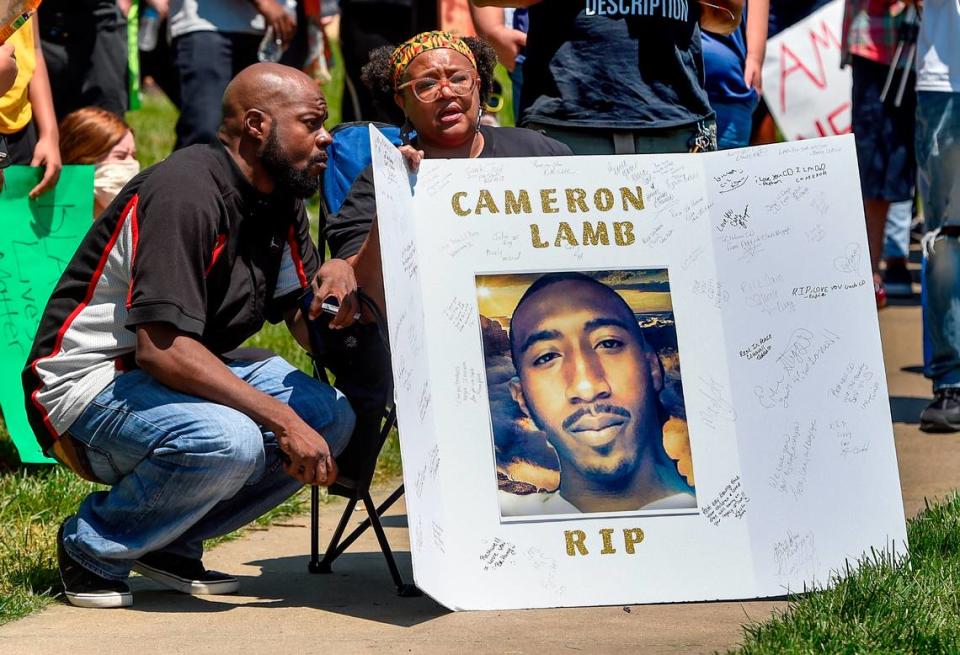
At a protest last summer at Mill Creek Park in front of several hundred people, Laurie Bey described the day as the “worst day of my life.”
That morning, she sent him a Facebook message: “Good morning son.” He replied: “Hey, what’s up mama.”
It was the last interaction they had.
Lamb was shot as he was backing into his garage in December 2019.
Police said the shooting happened after an officer went to investigate a disturbance between two vehicles on the road. A police helicopter tracked one of the vehicles as it pulled behind a home on College Avenue.
Detectives approached a man in the vehicle and “the officer was put in a position where he had to discharge his firearm,” a spokesman for the Kansas City Police Department previously told The Star.
Police investigating the shooting found Lamb inside the vehicle with his left arm and head hanging out of the driver’s side window. On the ground near his left hand was a handgun, police said.
“I don’t believe that for one minute,” Laurie Bey said.
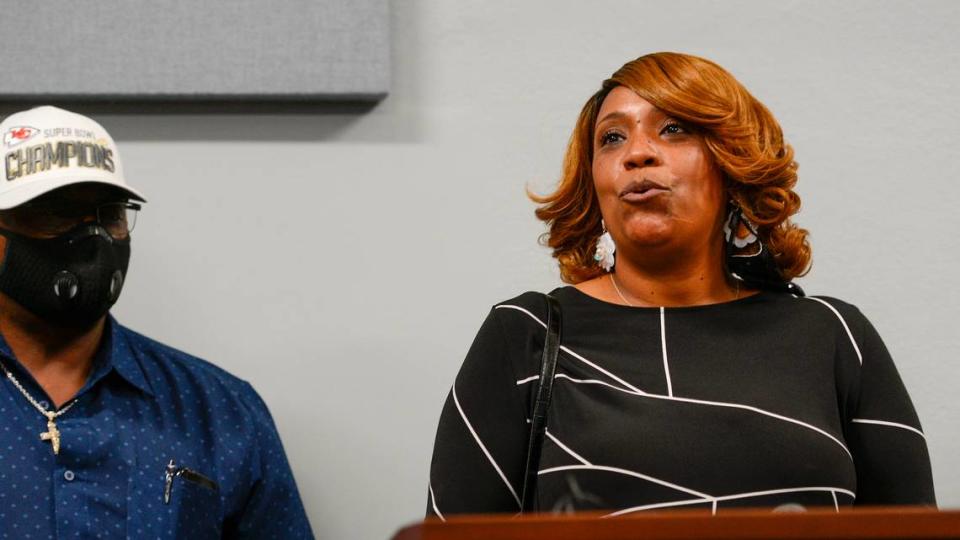
Eric J. DeValkenaere, 41, was charged with first-degree involuntary manslaughter and armed criminal action in the Dec. 3 killing.
The police department didn’t hand over the probable cause statement in the shooting, according to the Jackson County Prosecutor’s Office.
Bey’s daughter called her, excited about the Chauvin verdict news, as she was leaving an appointment with her oncologist. He was found guilty. Bey took a sigh of relief. She said she’s hopeful there will start to be a change in law enforcement.
But every time she hears of another death at the hands of police, a flood of emotions wash over her.
“For one, why is it that we always have to die at the hands of the police?” she said. “The only thing basically that we want is to be treated like you all.”
She was recently diagnosed with breast cancer. But when she found out, “I was like this is nothing because the worst has already happened to me.”
For these families, justice is complicated. True justice, they said, would be having their loved ones with them today.
Still, they want accountability. And they want the world to remember the names of their sons and brother: Ryan Stokes, Donnie Sanders, Terrance Bridges and Cameron Lamb.
